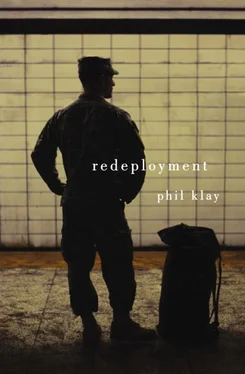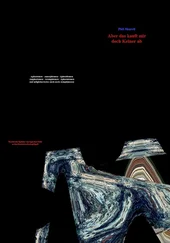At the same time, though, you feel somehow less. What happened, what I was a part of, maybe it was the right thing. We were fighting very bad people. But it was an ugly thing.
“When I’d left for the Army,” I said, “the living room had just three paintings on the wall—two icons, and one Matisse print of fish in a bowl. They’re my mother’s. Now alongside them there’s a framed American flag, and one of those 9/11 medallions that supposedly had steel from the World Trade Center but later turned out to be a scam. It was home, but…”
“You didn’t belong there anymore?” said Zara.
“Maybe not,” I said, “I don’t know. My dad was standing there in a suit. My mom had a little cross hanging from her neck. She got more religious when I went over. She prayed every day. And she told me if I wanted, she’d make me some kosheri, this lentil-tomato dish I love. And she put her hand on my back and started rubbing my shoulders, and I felt if I didn’t do something, I’d start crying.”
I kept my eyes on my hands, telling Zara the story. Looking at her would be too much, though maybe I could have let her see how I was feeling. Maybe she’d have pitied me. It wouldn’t have been entirely manipulative. I felt sad and lost. Somehow it felt the same as that day in my parents’ house, with my mom rubbing my shoulders and me thinking about what I’d been through and how much I would never tell her because it would only break her heart.
“But my dad,” I said, “he wouldn’t have it. ‘The boy’s back from war,’ he told my mom, ‘we should take him out for a real American meal. Outback Steakhouse!’ He thought that was a real funny joke. I didn’t know how to take it. Serious Copts are supposed to eat vegetarian about two hundred days out of the year—no food with a soul—and it was close to Christmas. But my mom didn’t say anything and so we went. My dad ordered a steak to show me it’d be all right. My mom and I had salads.
“We got through dinner with small talk, but when we got home my mom went off to work—she’s a nurse—and that left me and my dad alone. He sat me down in the living room and said he’d make me coffee. Then he handed me a few sheets of paper with a rubber band around them. He said, ‘I sent an e-mail out to the guys in the office, and they all wanted to thank you.’ He looked so happy and proud. It didn’t feel like basic. I wasn’t a disappointment. I’d been to war. And I’d missed him.”
I looked up at Zara and her eyes met mine. The darkness gave her a softer look than she had in the daytime.
“The paper,” I said, “it was printouts of e-mails from his Muslim friends at work.”
“He had Muslim friends?” she said.
“Colleagues,” I said. “Some friends. Sort of. He’d say he was keeping an eye on them. That was his joke. He works for a company that does translation services, mostly for NGOs and government agencies, and he’s in the Arabic department. So there’s a lot of Muslims. And they wrote me letters. Mostly short e-mails like, ‘Good job, thank you for your service,’ or, ‘Whether this war is right or wrong, you have done an honorable thing.’ But some were more involved. One talked about how the war was terrible, but he hoped having a ‘sensitive young man’ like me over there would make the suffering less.”
“A sensitive young man?” she said. I saw a hint of a smile.
“I’ve changed,” I said. “Another was from a guy who’d been in the Yemeni civil war. He told me, ‘Whatever you go through, it is the responsibility of those who sent you.’ And a bunch of the other e-mails were real pro-war.”
“I guess there was a lot of anger among American Muslims toward Saddam.”
“Well, one was so pro-war not even my father could have written it. That guy told me I was going to write a new chapter in history. My dad underlined the sentence.”
“And what’d you think,” she said, “when you saw that?”
“It made me angry,” I said.
My voice was soft, speaking to Zara. It was as though I were saying loving words.
“I didn’t tell him exactly what I told you,” I said. “I wanted to hurt him. I was angry. I’d gotten a lot of Thank You For Your Service handshakes, but nobody really knew what that service meant, you know?”
“You’re angry with your father because people thanked you for your service?” she said. “Or is he why you’re angry with those people?”
“He’s a part of it,” I said. “That sentiment.”
“So should I thank vets for their service?” she said. “Or spit on them, like Vietnam?”
I thought for a moment and then gave her a crooked smile. “I reserve the right to be angry at you whatever you do.”
“Why?”
“It’s all phony,” I said. “When the war started, almost three hundred congressmen voted for it. And seventy-seven senators. But now, everybody’s washed their hands of it.”
“There was bad information,” Zara said. “You know, ‘Bush lied, people died.’”
“Oh, my God!” I clapped my hands to my cheeks and put on a shocked face. “A politician lied! Then it’s not your fault!”
“You used to kill people with playground insults,” Zara said, “and you think it doesn’t matter what the president says? Or here’s a better question. Did you believe it? Did you support the war?”
“I still support the war,” I said. “Just not the guy who ran it.”
“Is that what you told your dad that made him so angry?”
“No.” I hunched over, with my elbows resting on my knees. “No. He knew the war was poorly run. He’s a smart guy.”
I considered how I could frame what I was going to tell her.
“This is not the sort of thing you’ll like,” I said. “It’s not the sort of thing my father could deal with.”
“I’m not fragile,” she said.
“Now you’ve got to understand,” I said. “In my family, I wasn’t even allowed to curse.”
I paused. After a second, Zara reached over and took my hand, and I let her. She shouldn’t have done that. It made me want to stop. It made me want to say something cruel, to let her know that what I’d been through had made me stronger, not weaker. From down the street I heard laughter. Frat kids from Psi U, maybe. Drunk, maybe, or just walking over to get a calzone at Bruno’s.
“I guess your dad wasn’t too big on you using dirty words to kill terrorists,” Zara said.
Her hand pressed into mine. “My dad thought the idea of the insults was funny,” I said. “He thought it was brilliant. Tribal culture is honor and shame. Like the rural South. Or inner-city America. But eventually we played that trick too much. We’d shouted too many insults, killed all the insurgents dumb enough to fall for it. And I’m telling this to my dad in our living room in their house in Virginia. It’s not the house I grew up in. They’d moved to a cheaper area once I was out of high school, and we’re in this tiny little room with an icon of Saint Moses the Black, who was a thief and a slave, and Saint Mary of Egypt, who was a prostitute, and Matisse’s stupid fish and that goddamn flag and the fake 9/11 steel coin. And he’s leaning forward, he’s listening. It’s the first man-to-man we’ve ever had.”
“And it’s about war,” she said. “That’s what gets him to listen.”
“So I tell him how there’s this one area where intel knows who the enemy is. This little band of Islamists called the al-Tawhid Martyrs Brigade. And my dad’s like, ‘Okay. Al-Qaeda.’ And I’m like, ‘No. Just desert fuckers who didn’t like having Americans roaming around in their country.’ It was the first time I’d cursed in front of my dad.”
“What’d he do?”
“Nothing. He just said, ‘Okay. So basically al-Qaeda.’ I wanted to smack him.” I took a breath. “Anyway, we knew the name of these guys’ leader. Laith al-Tawhid. Intel had him on the BOLO list and so I had his name.”
Читать дальше












